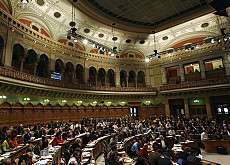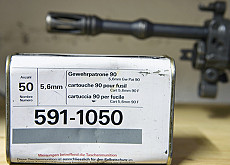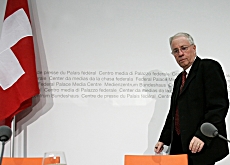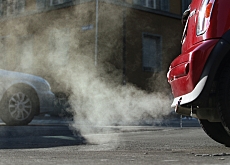Summer parliamentary session covers hot topics

Parliamentarians will certainly not be twiddling their thumbs during the penultimate session of the current legislative period.
They will tackle several controversial issues when the session begins on Monday, including the naturalisation of foreigners and the promotion of national languages, in addition to the familiar theme of keeping army guns at home.
The initiative “for democratic naturalisations” proposed by the rightwing Swiss People’s Party promises a lively debate in the House of Representatives. A parliamentary committee has recommended – by a very small majority – that the text be accepted, to the disagreement of the left.
The initiative wants citizens to keep the final say at the ballot box on citizenship applications, instead of leaving it up to an elected commission.
This procedure has been subject to heated criticism and media attention in recent years, notably when voters in the town of Emmen in central Switzerland repeatedly rejected the naturalisation of foreigners, especially those from the Balkans.
The People’s Party says the popular vote on citizenship is a fundamental democratic right. Its opponents say it enables discrimination against certain groups.
Tongue-tied
Waves will also be created during the discussion of the promotion of the four national languages – German, French, Italian and Romansh – and the first foreign language to be taught in schools.
This bill was buried by the government for financial reasons but then dug up by Christian Levrat from the centre-left Social Democratic Party.
The text proposes that at school a national language takes priority over English. This is in contrast to the compromise agreed by the cantons under which primary school pupils would have to study two languages other than one’s mother tongue, but whether English is one of them is left to the cantonal authorities.
Like naturalisation, the language debate has also gone on for years. It all began when the education authorities in canton Zurich decided to prioritise English over French. This decision, which was copied in other German-speaking cantons, raised emotions in Francophone cantons.
Guns at home
Parliament is also set to debate the future of army weapons being kept at home, one of the most divisive issues in Switzerland.
At present all able-bodied Swiss men aged 20-30 are conscripted for about three months and issued with a rifle. After initial training, they are required to do three or four weeks of army service a year until they have served a total of 260 days or reached the age of 34. Throughout this time they keep their rifles and 50 rounds of ammunition at home.
But a spate of tragedies has made many Swiss wonder whether being able to mobilise thousands of armed men at short notice is nowadays really worth increased family massacres and suicides.
Five years ago Switzerland was stunned when a gunman shot and killed 14 people in Zug’s cantonal parliament with his army rifle, before turning the gun on himself.
Debate on the use of firearms was further fuelled in April last year when the husband of former women’s ski champion Corinne Rey-Bellet killed his wife and her brother with his army pistol.
It has also been estimated that every day, one person kills himself or herself with a gun, more often than not a military weapon.
A proposal put forward for discussion by a parliamentary committee would allow for around 2,000 specialist troops, such as those guarding airports and other important installations, to keep ammunition at home. The government would also be able to lift the ban in the event of a security crisis.
swissinfo with agencies
Parliament’s summer session, the penultimate of the current four-year term takes place from June 4-22.
The House of Representatives will sit on two Mondays until 10pm and three extended meetings are planned. One extended meeting might be held in the Senate.
All of the seats in the House and virtually all of those in the Senate will be at stake during federal elections which take place on October 21.

In compliance with the JTI standards
More: SWI swissinfo.ch certified by the Journalism Trust Initiative



You can find an overview of ongoing debates with our journalists here. Please join us!
If you want to start a conversation about a topic raised in this article or want to report factual errors, email us at english@swissinfo.ch.